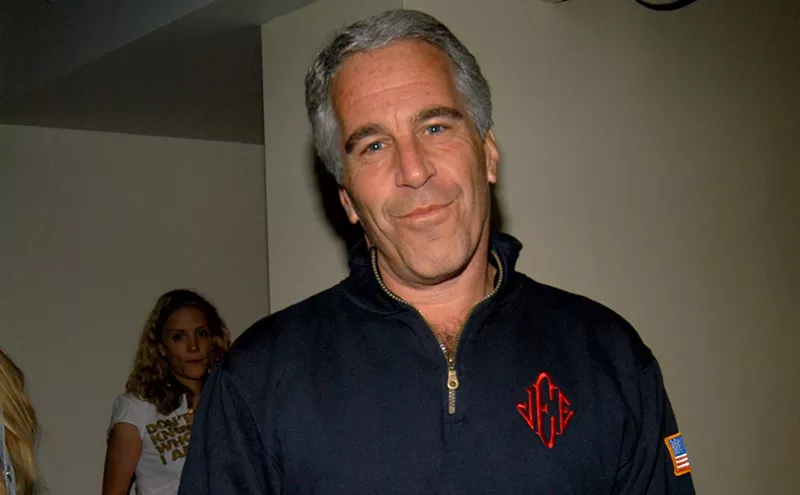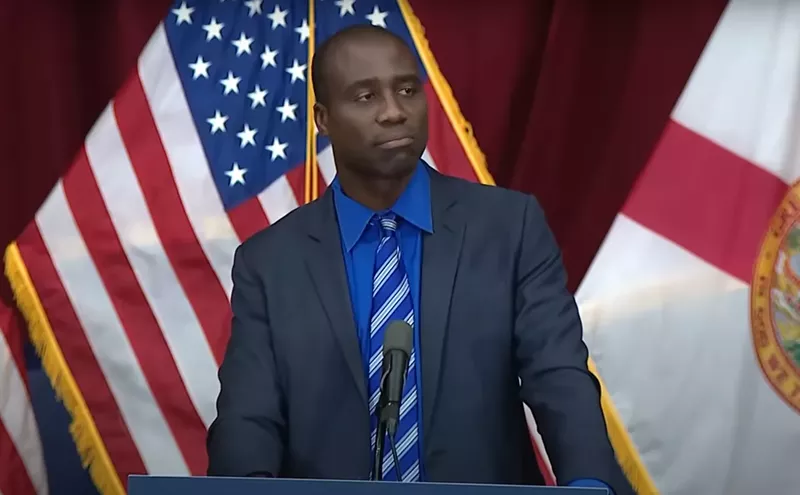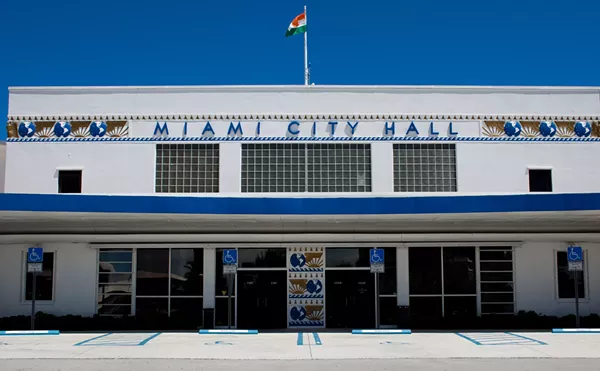Roderick "Rick" Beasley earns more than Miami-Dade Mayor Carlos Gimenez. The burly middle-aged bureaucrat with a penchant for bow ties runs CareerSource South Florida, a county agency that connects thousands of local job seekers and employers. With a $70 million budget fed by state and federal funds, it's the largest operation of its type in Florida and one of the biggest workforce boards in the nation.
But that's not all. Beasley (who made $179,676 in 2013, compared to Gimenez's $146,023) sits on the President's Council at Florida International University and the board of the Miami-Dade Early Learning Coalition, a nonprofit that advocates for children, and in February, he was elected president of the U.S. Conference of Mayors Workforce Development Council, which Gimenez called "an extraordinary honor." He's even president of the local Pi Nu Chapter of Omega Psi Phi, a predominantly African-American fraternity with well-known members such as Bill Cosby, Michael Jordan, and Rev. Jesse Jackson.
So it's a surprise to hear claims from a group of eight former Beasley employees who call themselves the Workforce-8. They maintain that the 49-year-old regularly bullies, verbally abuses, and even tosses staplers at female employees before pushing them out. "He destroyed our livelihoods," says Linda Pierre, a 36-year-old former research analyst. "We are all strong, smart, educated women of all ages and races, and he just couldn't live with that."
Pierre was moved from her large cubicle to a smaller one in a part of the office known as "death row."
tweet this
Pierre, who was fired in August 2014, has spent the past seven years reporting Beasley's alleged discrimination to authorities yet getting no traction. She penned scores of pages of comments in response to negative job reviews documenting Beasley's behavior, but no one seemed to care. The Office of Human Rights and Fair Employment Practices determined there was no reasonable cause to believe she was discriminated against, and the Office of the Inspector General and the Miami-Dade Commission on Ethics and Public Trust also failed to take action.
Then, finally, this past July and August, the federal Equal Employment Opportunity Commission (EEOC) sided with Pierre and others who had complained about Beasley. The commission agreed he had discriminated against Pierre and retaliated against her after she complained. More striking, it concluded that women working for Beasley had been "subjected to the same pattern of harassment, intimidation, exclusion, bullying... conditions due to their sex."
Beasley has consistently denied the claims. Contacted by New Times, he declined to respond to the allegations in detail, saying only, "I treat all men and women, black and white, fairly. Now, I never said I was a perfect boss... Only one of the women worked for me directly... They never interviewed any of the men."
Beasley, along with his twin brother Rodney, grew up in a middle-class neighborhood in Kansas City, Missouri. His father, Joe, was born on a plantation in Georgia, excelled in school, and went on to the U.S. Air Force, where he served for 21 years. Later, he joined Operation PUSH (People United to Serve Humanity), a nonprofit founded by Rev. Jesse Jackson Sr.
Rick Beasley attended public high school in Kansas City and then earned a bachelor's degree in economics from Lincoln University in Jefferson City. He graduated in 1991 and worked as a district manager at an Aldi supermarket. In 1996, he received a master's degree in public administration and began working as a program manager and research analyst with the Missouri Department of Labor and Industrial Relations.
By 2001, he had become state director of the Missouri Division of Workforce Development, where he managed a $127 million budget and oversaw more than 500 employees. Around this time, he married Melinda Grace, a labor attorney with the Missouri Department of Transportation. The couple has four sons.
At the helm of the Missouri state employment board, Beasley was highly praised and received the Governor's Award for Quality and Productivity. But in 2005, a former employee, Jeffrey Lipp, accused the career center in Joplin, a town about two-and-a-half hours south of Kansas City, of squandering millions in federal funding. He also said that job applications of Hispanics, Asians, and veterans were often ignored, the Joplin Globe reported at the time. Beasley, Lipp's boss, disputed the claims and called Lipp a disgruntled former employee "trying to make the career center in Joplin look bad."
Lipp filed a complaint with the EEOC against the Missouri Division of Workforce Development. The federal agency ruled that he had a right to sue over the discrimination. But the case fizzled when Lipp was fired from his job and decided not to pursue the matter. He told the newspaper that he had complained only in an attempt to keep his job.
At some point, Beasley and Melinda divorced. In 2006, Beasley began working at CareerSource South Florida, an operation with 400 fewer employees and a budget $50 million less than the Missouri employment board's.
In 2006, an anonymous person reported Beasley to the Miami-Dade Office of Human Rights and Fair Employment Practices. He was accused of "conduct unbecoming" after allegedly calling the director of a youth program a "whore" during a meeting, according to an investigative report.
The investigator couldn't verify that claim but found that Beasley had told her to "just sign the fucking contract," said "?'fuck' at least three times," and "really offended her religious sensibilities." But no action was taken, according to a closeout memo, because "Beasley apologized to her personally and publicly... She accepted his apology, and everyone concerned has moved on."
Linda Pierre, a petite woman with short chestnut-colored hair, began working as an administrator in the department in 2006. The 36-year-old Haitian-American says at first she got along with Beasley, but then, in August 2008, she put in for a transfer because, she says, she didn't work well with him. The reason, she adds, is that she would speak up at meetings to correct Beasley when he misspoke.
Pierre says that in December 2007, he stopped responding to her emails and once even hurled a stapler at her head during a meeting. "I didn't like the way he yelled at me. The tone was off. It was aggressive," she says. "Not even my parents yelled at me like that."
After one confrontation, she claims, Beasley began stripping away her job duties. In January 2009, she was transferred to work for Juan Hernandez, an adult-programs manager who answered to Beasley. It was around this time that Pierre was moved from her large cubicle overlooking a Miami International Airport runway to a smaller one in a secluded part of the office known as "death row."
That's where Pierre met other women who also complained of their treatment by Beasley. "I thought I was the only one experiencing this, that it was personal," Pierre says. "Then I started piecing it together. This man just can't work with women."
Next week: The Workforce-8 makes its case.












